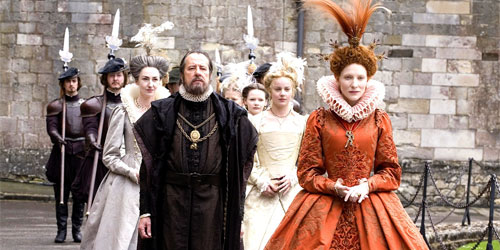Geoffrey Rush as Sir Francis Walsingham and Cate Blanchett as Queen Elizabeth I in Universal Pictures’ Elizabeth: The Golden Age – 2007
‘‘Elizabethan England’’ remained a minor power, distinctly disadvantaged vis-á-vis the true Great Powers by its small population and the weakness of its army. Elizabeth compensated for weak territorial defenses by building a first-class navy and commissioning privateer ships and captains. She used this naval power to deflect French plans to invade Scotland in support of the Catholic party there (1558, 1560, and 1600). She instructed her privateers in a long though unofficial war at sea with Spain, from which she profited handsomely. With the help of William Cecil, she was brilliantly effective at diplomacy. She kept the pot boiling between an ancient foe, France, and a new archenemy, Spain, to keep both distracted and from her shores. She declined a desperate offer of sovereignty over the Netherlands in May 1585, but materially supported the Dutch ‘‘Beggars’’ as they stumbled toward near-defeat, exacting hard terms for her aid in the Treaty of Nonsuch. She dispatched privateers to the Caribbean to troll for treasure ships and to Newfoundland to harry the Iberian fishing fleets off the Grand Banks. When Philip replied with an embargo on English trade she sent Francis Drake to raided the Spanish coast in 1587, ‘‘singeing the beard’’ of the king by burning his ships and warehouses. Drake’s insouciant desecration of Catholic churches and smashing of shrines in Spain, along with Elizabeth’s execution of the Catholic Queen, Mary Stuart, provoked Philip to finally declare war on the ‘‘harlot usurper’’ in London.
Added to Elizabeth’s mounting blows against Spain’s economic interests and her alliance with the Dutch rebels was Philip’s belief that it was God’s plan that he should annex England to his empire to return it to the Catholic fold. Direct conflict no longer could be avoided. In 1588 the Navy Royale, along with bad weather in the Channel, defeated—or rather, deflected northward—the ‘‘Invincible Armada’’ sent by Philip to collect an army from Flanders and convoy it to England. That victory, or more accurately that avoidance of defeat, appeared so miraculous that many of Elizabeth’s subjects came to see in England the New Israel, defended by God himself and his favorable ‘‘Protestant Wind.’’ Her generals pressed the war hard against Catholic rebels in Scotland and Ireland who had accepted Spanish backing. Inflows of troops extended the Elizabethan conquest of Ireland, that dangerous Catholic neighbor and potential strategic backdoor to England, during the Nine Years’ War (1594–1603). Upon Elizabeth’s death in 1603, she left a kingdom more secure and united and more stable and prosperous than she had found it. And she left a realm that was ready to set out on a path of overseas colonization that would culminate in a world-spanning empire. Though her wars left the country financially crippled, that was not a situation of her choosing or a result she might have avoided. It was the common fate of royal finances in an age of chronic confessional warfare and ever expanding armies and navies. Among her greatest achievements was recognition that it was in England’s interest to oppose any large power that might dominate the Continent, be it Spain or France. She never carried confessionalism in foreign policy to the point of foolish promotion of the unattainable goal of destruction of either Catholic power. Reduction or distraction of the threat they posed to her small kingdom was enough. Besides, it was better that they balance against each other while she prepared the way for England’s maritime expansion and later military greatness. To her anguished regret, Elizabeth died a childless spinster, last of the Tudors. She was succeeded by James I, son of her archrival Mary Stuart.
The Elizabethan era was a time associated with Queen Elizabeth I’s reign (1558–1603) and is often considered to be the golden age in English history. It was the height of the English Renaissance and saw the flowering of English poetry, music and literature. This was also the time during which Elizabethan theatre flourished, and William Shakespeare and many others composed plays that broke free of England’s past style of plays and theatre. It was an age of exploration and expansion abroad, while back at home, the Protestant Reformation became more acceptable to the people, most certainly after the Spanish Armada was repulsed. It was also the end of the period when England was a separate realm before its royal union with Scotland.
The Elizabethan Age is viewed so highly because of the periods before and after. It was a brief period of largely internal peace between the English Reformation and the battles between Protestants and Catholics and the battles between parliament and the monarchy that engulfed the seventeenth century. The Protestant/Catholic divide was settled, for a time, by the Elizabethan Religious Settlement, and parliament was not yet strong enough to challenge royal absolutism. England was also well-off compared to the other nations of Europe. The Italian Renaissance had come to an end under the weight of foreign domination of the peninsula. France was embroiled in its own religious battles that would only be settled in 1598 with the Edict of Nantes. In part because of this, but also because the English had been expelled from their last outposts on the continent, the centuries long conflict between France and England was largely suspended for most of Elizabeth’s reign.
England during this period had a centralised, well-organised, and effective government, largely a result of the reforms of Henry VII and Henry VIII. Economically, the country began to benefit greatly from the new era of trans-Atlantic trade.
